History of IMCB
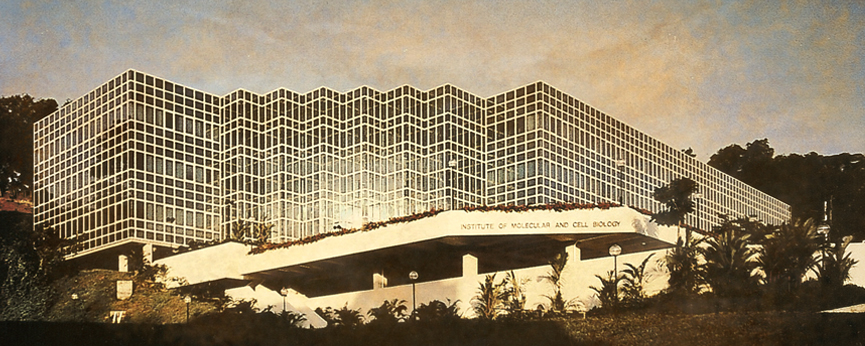
The Institute of Molecular and Cell Biology (IMCB) was established on January 23, 1985, and officially inaugurated on October 2, 1987, at the National University of Singapore (NUS). IMCB’s founding marked the beginning of Singapore's journey in pioneering biomedical research. Over the years, IMCB has evolved into a premier research institute under the Agency for Science, Technology and Research (A*STAR), moving to the Biopolis research hub in 2004 to enhance its capabilities. |
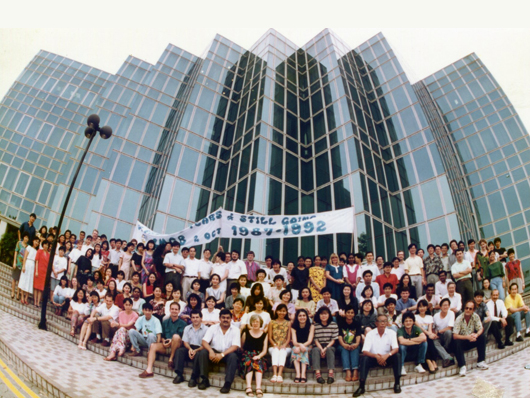
Staff Group Photo,
Old IMCB building, 2 October 1992.
1985-2000: Laying Down the Foundation for Biomedical Research
During its early years, IMCB focused on building a strong foundation in biomedical research. Notable milestones include the completion of the first dengue virus type 1 sequence in 1992 and the establishment of significant industry partnerships, such as the collaboration with Glaxo for research on degenerative brain diseases in 1989. In 2000, IMCB was awarded the Nikkei Asia Prize for its contributions to biological research in Asia. As Pioneers of the Past, IMCB set the foundation for biomedical research in Singapore, establishing a legacy that continues to influence the region’s scientific landscape.
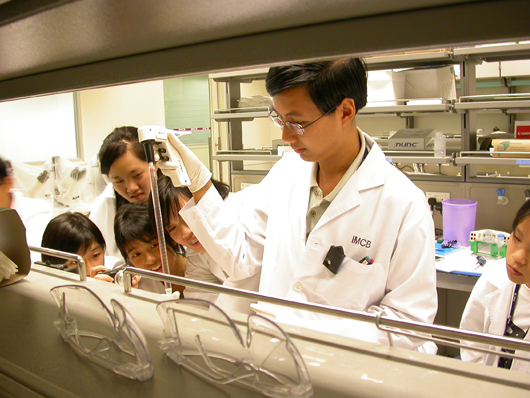
IMCB Student Outreach, 2006.
2001-2010: Building Critical Talent Pipeline for Singapore
Under the leadership of Acting Director Wanjin Hong (2001-2004), Executive Directors David lane (2004-2007) and Neal Copeland (2007-2010), and Acting Director Steve Cohen (2010-2011), IMCB not only expanded its research scope but also became a significant incubator of talent, shaping the next generation of leaders in biomedical research and industry. Over the years, IMCB has trained hundreds of scientists and researchers who have gone on to hold influential positions across academia, industry, and government bodies. IMCB alumni are now serving as senior leaders, including Chief Executive Officers, Chief Scientific Officers, and Senior Directors in prominent biotech and pharmaceutical companies. Many have also transitioned into academia, holding prestigious positions as Professors and Associate Vice Presidents at leading local and overseas universities. Others have moved into significant roles within government bodies and research institutes, driving national and international research agendas.
This robust alumni network underscores IMCB’s critical role in developing top-tier talent that drives innovation and excellence in the biomedical field. As IMCB continues to grow, it remains a central player in Singapore’s biomedical research landscape, fostering collaboration and training that shape the future of science.
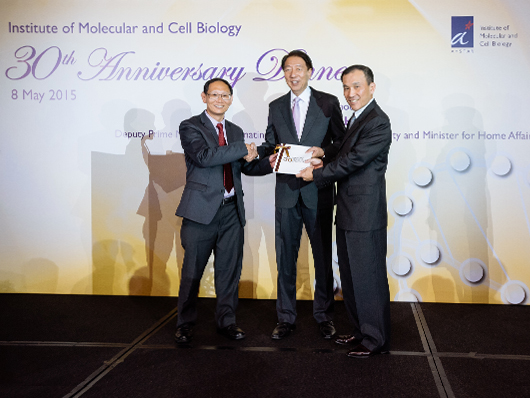
IMCB Executive Director Prof Wanjin Hong, Deputy Prime Minister Teo Chee Hean and A*STAR Chairman Lim Chuan Poh at the IMCB 30th Anniversary dinner, 8 May 2015.
2011-2023: Sharpening focus on technology innovation and industry collaboration for economic impact.
Under the leadership of Prof. Wanjin Hong since 2011, IMCB has fostered a culture of innovation through strategic industry partnerships and successful spin-offs. As Innovators of the Present, IMCB has focused on collaborating with esteemed companies like Procter & Gamble and Abcam to translate groundbreaking research into commercially viable solutions. These partnerships have yielded significant breakthroughs in cancer research, particularly in the areas of cell signaling, metabolism, and the development of cutting-edge diagnostic tools and therapeutic strategies.
IMCB’s impact on the biotechnology landscape is further highlighted by its successful spin-offs, such as BioCheetah Pte Ltd, Sunbird Bio Pte Ltd, and InnoCellular Tech Pte Ltd, which continue to drive innovation and commercialization in biotech. Notably, IMCB's joint immuno-oncology laboratory with Tessa Therapeutics has leveraged Tessa's pioneering Virus Specific T cell (VST) platform to develop next-generation immunotherapies for solid tumors, underscoring IMCB's profound influence on advancing biotherapeutic research.
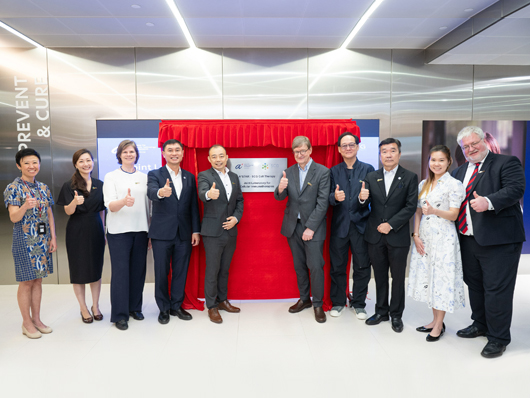
SCG Cell Therapy and A*STAR Launch Joint Laboratories with Collaboration Nearing $30M for Cellular Immunotherapies, 17 Apr 2024.
2023-Present: Strategic Innovation and Advancing Frontiers for Healthcare Impact
Currently led by Executive Director A/Prof Su Xinyi, IMCB continues to drive breakthroughs in various research areas, including neuroscience, cancer and cellular therapy. Through active contributions to strategic national initiatives such as the Singapore Neuroscience Initiative, the Nucleic Acid Therapeutics Initiative (NATi), and the National Initiative for RNA Biology and Its Application (NIRBA), IMCB demonstrates its commitment to addressing both national and global health challenges. By incubating technologies to support these emerging national-level programs and integrating artificial intelligence for biomarker discovery and drug development, IMCB is looking ahead as Trailblazers for the Future, advancing biomedical research and creating transformative health solutions for the next generation.
A*STAR celebrates International Women's Day

From groundbreaking discoveries to cutting-edge research, our researchers are empowering the next generation of female science, technology, engineering and mathematics (STEM) leaders.
Get inspired by our #WomeninSTEM
.png?sfvrsn=c3edc68e_6)